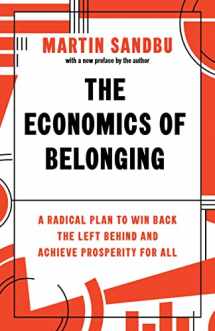
The Economics of Belonging: A Radical Plan to Win Back the Left Behind and Achieve Prosperity for All
Book details
Summary
Description
Review
"Winner of the Silver Medal in Business Theory, Axiom Business Book Awards"
"The real argument of the book comes in the second half, namely that a set of radical but feasible policies holds the solution to inequality. And, if they were implemented, Sandbu eloquently argues, more globalisation would benefit all and defang populist polarisation."---Diane Coyle, Financial Times
"[A] brilliant, if sometimes controversial, exposition of what ails our economies and political systems."---Chris Johns, Irish Times
"The Economics of Belonging is a competent, confidently articulated survey of the academic economics literature on inequality."---Paul Collier, Prospect
"This is a crisply written analysis of economic discontents and their political consequences. Though written in the pre-pandemic era, the conclusions and prescriptions of this book are very relevant to our current debates."---Paschal Donohoe, Irish Times
"A wealth of analysis and insight [in] a few hundred pages."---Peter Thal Larsen, Reuters Breakingviews
"Sophisticated and engaging. . . . Thorough and compelling."---Paolo Mauro, Finance & Development
"The Economics of Belonging is an important contribution to the debate about the ‘left-behind’. Sandbu offers a highly readable and carefully argued narrative, which marshals evidence adroitly and proposes a range of policy prescriptions, many of which are persuasive and deserve serious attention."---John Tomaney, LSE Review of Books
"One of Sandbu’s great strengths is his ability to combine analysis of microeconomic welfare policy with macroeconomic and financial policy. . . . An important achievement of this book is to show that many measures both reduce inequality and improve productivity and growth."---Paul Segal, Journal of Economic Inequality
A radical new approach to economic policy that addresses the symptoms and causes of inequality in Western society today
Fueled by populism and the frustrations of the disenfranchised, the past few years have witnessed the widespread rejection of the economic and political order that Western countries built up after 1945. Political debates have turned into violent clashes between those who want to “take their country back” and those viewed as defending an elitist, broken, and unpatriotic social contract. There seems to be an increasing polarization of values. The Economics of Belonging argues that we should step back and take a fresh look at the root causes of our current challenges. In this original, engaging book, Martin Sandbu argues that economics remains at the heart of our widening inequality and it is only by focusing on the right policies that we can address it. He proposes a detailed, radical plan for creating a just economy where everyone can belong.
Sandbu demonstrates that the rising numbers of the left behind are not due to globalization gone too far. Rather, technological change and flawed but avoidable domestic policies have eroded the foundations of an economy in which everyone can participate―and would have done so even with a much less globalized economy. Sandbu contends that we have to double down on economic openness while pursuing dramatic reforms involving productivity, regional development, support for small- and medium-sized businesses, and increased worker representation. He discusses how a more active macroeconomic policy, education for all, universal basic income, and better taxation of capital could work together for society’s benefit.
Offering real answers, not invective, for facing our most serious political issues, The Economics of Belonging shows how a better economic system can work for all.


We would LOVE it if you could help us and other readers by reviewing the book
Book review



